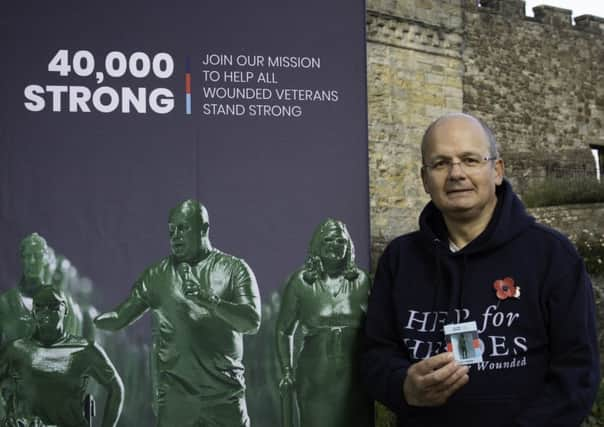Fife veteran backs charity’s call to support ex-servicemen


In a poll released by Help for Heroes for the launch of it’s 40,000 Strong campaign, 70 per cent of wounded veterans described their medical discharge as “negative” and over 60 per cent felt they hadn’t received enough support while transitioning out of the Armed Forces.
The charity is now calling on the UK Government to review the existing medical discharge process to ensure those forced to leave the military as a result of injuries or illness are given the best possible opportunity to transition well into civilian life.
You might also be interested in
Advertisement
Hide AdAdvertisement
Hide AdAmong those who took part in the survey was former RAF squadron leader Ken de Soyza, who was medically discharged after 22 years of service when an undiagnosed and untreated service-related back injury led to severe spasms.
Ken (57), said: “The result of the medical board decision was that I had to clear my desk and not return to work.
“It never occurred to me that after this no one would keep in contact with me or follow up. I had to hand in my RAF identity card, rail pass and return my uniforms.
Advertisement
Hide AdAdvertisement
Hide Ad“We had to lodge an application to the Married Quarters Manager which resulted in a legal notice telling us when we would need to leave our quarter.
“The resettlement courses I was offered were some distance away on another unit. I was amused at the disconnect between me being considered to be unfit for further service because of back pain and therefore, limited in capability to travel and yet, I was expected to drive distances for courses.
“The resettlement courses only ever focused on drafting a CV and how ex-Forces personnel could set up franchises. There was nothing about living in the ‘real world’.
“The emotions hit me later with constant dreaming about being back on the unit. I felt so isolated afterwards. Now I just feel as if I just don’t quite fit in the civilian community.”
Advertisement
Hide AdAdvertisement
Hide AdKen met other Scottish veterans at Stirling Castle recently to launch the 40,000 Strong campaign in Scotland.
A display of 5000 miniature figures was displayed in the city’s Thistle Centre at the weekend to illustrate the scale of the issue.
The figures are representative of a larger installation of 40,000 miniature model veterans used to show the true scale of those who put their lives on the line in recent conflicts but were unable to continue their service due to injury or illness.
Rob Colgrave, Scottish fundraising manager for Help for Heroes, said: “The medical discharge process is seriously failing those who are let down by major inconsistencies in support, so we’re calling on the UK Government to commission an independent review of the process to close those gaps.
“With the public’s support, we’re on a mission to ensure every wounded hero has the best opportunity to stand strong in civilian life.”